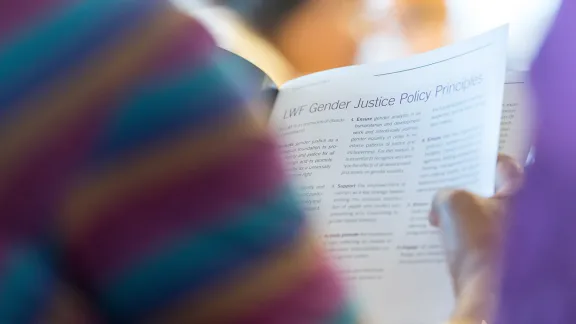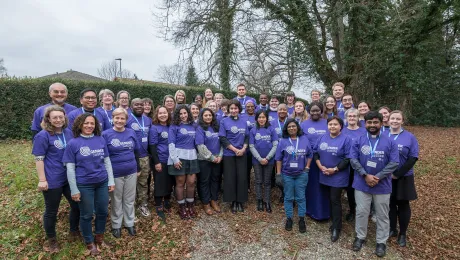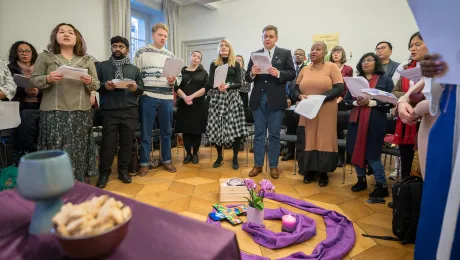LWF’s General Secretary Burghardt joins gender justice advocates to reflect on the theological foundations of the communion’s Gender Justice Policy and explore its impact on member churches around the world

A participant reads the Gender Justice Policy during the recent women’s pre-Assembly in Wroclaw, Poland. Photo: LWF/A. Hillert
For Freedom Christ has set us free’ was the title of a webinar exploring progress and challenges remaining
(LWI) - The theological and biblical foundations of the Gender Justice Policy of the Lutheran World Federation (LWF), launched in Geneva a decade ago, were at the heart of a 7 December webinar which explored its impact on member churches, as well as the many challenges remaining for its full implementation.
Entitled ‘For Freedom Christ has set us free’, the online meeting marked a celebration of the progress made towards promoting women’s ministry and leadership in the church, as well as a reaffirmation of LWF’s commitment to pursuing just relationships, at a time of global pushback against women’s rights.
LWF General Secretary, Rev. Dr Anne Burghardt reflected on the “equal dignity and value” of all human beings, presented in the creation stories, to “support each other and carry each other’s burdens.” She affirmed that “No culture, tradition or theology should be used to enslave people. We give witness to the faith that Christ has set us free to love, welcome and embrace each other!”
Christ calls people to proclaim the gospel regardless of their gender.
LWF General Secretary Rev. Dr Anne Burghardt
Noting that through the Incarnation, Jesus brought salvation to all human beings, she stressed that “Christ also calls people to proclaim the gospel regardless of their gender.” The deeply rooted theological and biblical foundations of the Gender Justice Policy, she said, emphasize that “being justified by God’s grace involves liberation from the fulfilment of patriarchal traditions and values and empowers individuals to resist and engage in actions of transformation." Theological ideas “that call for the submission of women and that limit their ability to use their gifts in building up the body of Christ truly need to be questioned,” she insisted.
Examples from Brazil, Palestine, Hong Kong
Three gender justice advocates from different parts of the globe shared ways in which their churches have been engaging with the LWF policy over the past decade to implement its values and principles within their own local contexts. Sabrina Senger, Gender and Religion Program coordinator at the Faculdades EST in Brazil, noted that her institution was inspired by the LWF to construct its own policy, which incorporates seven strategic gender justice principles.
These include the use of gender-inclusive language, mainstreaming the policy beyond the limits of the Gender and Religion program, overcoming male dominance in management and knowledge production, creating a gender balance, overcoming violence, education around gender justice, and a focus on the intersectionality of gender with other issues such as race, class, ethnicity and disability.
Shadin Nassar, Gender Justice Ministry Program Coordinator for the Evangelical Lutheran Church in Jordan and the Holy Land (ELCJHL) talked about the “complex political and socio-economic challenges that significantly impact the lives of people” in Palestine. The protracted Israeli occupation, combined with “deeply rooted traditional gender norms and patriarchal gender roles” continue to reinforce inequalities and “intensify the vulnerability of women and girls," she said. This can include families becoming more protective and refraining from sending girls to schools and universities, limiting their access to education, work and other essential services, she noted.
Eradicating inequalities, amplifying women’s voices
Nassar also spoke of the important steps that her church has taken, inspired by the LWF policy, “to eradicate patterns of inequality, amplify the voices of women and girls and promote women’s leadership in church and society.” These include reforming its personal and family laws to protect women’s rights, appointing female judges to its Ecclesiastical court, appointing women to key decision-making bodies, ordaining the first female pastor in Palestine and becoming a member of national planning committees working to end gender inequality. She added that the ELCJHL is dedicated to empowering youth, as well as fostering the inclusion of men and boys in conversations about gender justice.
Leon Chau, General Secretary of the Chinese Rhenish Church Hong Kong Synod, shared the journey of his church towards women’s ordination and leadership over the past four decades. He explained how traditional attitudes and misleading teachings about women’s role in the church need to be “overcome with biblical interpretation, theology, logic and common sense.” He highlighted the way that “anxiety about changes and power sharing can slow down the process of gender justice.”
Chau also addressed the need for “equal opportunities in education and training,” noting that some opponents of women’s ordination say that no candidates are available for ministry. He noted that women in his church are still not endorsed for lay ordination as elders or presbyters, but he urged men to work consistently together with women to challenge the obstacles that still stand in the way of equal opportunities for all.
Charting the way forward
Reflecting on the way forward, Dr Mary Streufert, director for Gender Justice and Women’s Empowerment in the Evangelical Lutheran Church in America, shared her experience of being part of the original advisory group that drafted the first version of the Gender Justice Policy over a decade ago. She recalled how the five group members sometimes “disagreed with each other or simply did not understand each other, and at other times, we were quickly of one mind – the way it is in the church.”
Yet at all times, she stressed, “We cared about each other deeply and we cared about all the people in the LWF member churches.” The discussions, she recalled, were grounded in the way that “God works through the sacraments of Baptism and Holy Communion,” not to create uniformity but to enable us to love our neighbors “not only when relationships or processes are easy, but also when we disagree with each other and when we don’t even understand each other.”
Key needs for our shared future
Over the past decade, she continued, the LWF communion office and member churches have been working to combat sexual and gender-based violence, advocating for effective laws, as well as awareness raising and educating in congregations, schools and through faith-based partnerships. She spoke of the need for a simplified version of the policy, as well as “processes of dialogue to support each other across regions” and different church contexts.
In conclusion, Streufert pointed to “four other key needs for our shared future,” as highlighted by women at the recent pre-assemblies. They are “development, education and proclamation of the gospel through feminist and womanist Lutheran theologies,” tools to resist fundamentalisms and misleading theologies, shared listening and action, including communal reflection on masculinities, as well as liturgical and worship resources drawn from feminist scholarship and “other liberative Lutheran theologies.”


